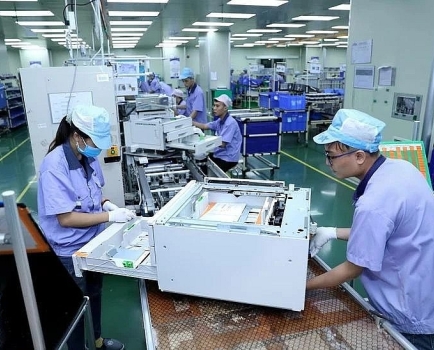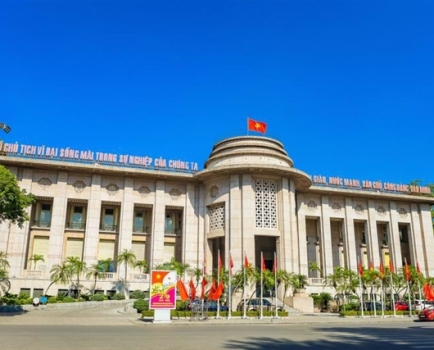Expansionary fiscal policy halts decline, boosts aggregate demand
Mon, 16 Dec 2024 11:15:00 | Print | Email Share:
Customs News interviews Ms. Nguyen Thanh Nga, Deputy Director of the Institute for Financial Strategy and Policy (Ministry of Finance).
 |
Could you please outline the solutions implemented by the National Assembly and the Government to stimulate aggregate demand and support economic development?
In response to the decline in aggregate demand, the National Assembly and the Government have implemented numerous fiscal and monetary policy solutions. Throughout 2023 and the early months of 2024, financial policies were managed with controlled easing, contributing to supporting aggregate demand, promoting reasonable economic growth, and stabilizing the macroeconomy.
Fiscal policy, in particular, has been implemented with a reasonable, focused, and targeted expansionary approach to halt the decline, boost aggregate demand, and foster economic recovery.
In 2023 alone, the total amount of taxes and fees waived, reduced, or deferred reached approximately 191.5 trillion VND; this figure is estimated to be around 189.6 trillion VND in 2024. Thanks to the flexible, focused, and timely expansionary fiscal policy, difficulties in production and business were alleviated, contributing to economic growth while ensuring the balance of state budget revenues and expenditures.
Furthermore, the accommodative monetary policy, reflected in increased money supply and proactive and flexible exchange rate management, has helped adapt to unpredictable developments and pressures from the international market, contributing to stabilizing the domestic currency and price levels. Timely adjustments to the exchange rate band have maintained the stability of the domestic currency, fostering confidence in business and consumption.
Through flexible adjustments to financial policies, along with the expansion and diversification of export markets, promotion of administrative reforms, and attraction of investment, exports and investment have shown signs of recovery, and consumption of goods and services has been stimulated.
Especially in the context of numerous challenges facing small and medium-sized enterprises, the implementation of tax and fee waivers, reductions, and deferrals has provided practical support, giving them additional resources for investment and improving the efficiency of production and business activities. Furthermore, the reduction in value-added tax (VAT) has enhanced product consumption, thereby increasing revenue and profits for businesses.
What are the current challenges in boosting aggregate demand and supporting Vietnam's economic development?
Despite timely and flexible adjustments to financial policies to support and stimulate aggregate demand, some challenges remain.
Regarding consumption, inflationary pressure remains a significant risk, driven by rising prices of raw materials and fluctuating transportation costs. While the Consumer Price Index (CPI) in 2023 and the first ten months of 2024 remained within the National Assembly's target, and consumer demand has generally shown signs of recovery, inflation, though controlled within the target range, has been more volatile than in previous periods.
Global economic and political fluctuations, including political instability in some countries and regions, have also increased the propensity to save and limited consumption. These fluctuations can cause uncertainty in consumer sentiment and affect import and export activities, potentially disrupting supply chains. Meanwhile, overall household income remains low.
Regarding investment, given its crucial role in aggregate demand, the slowdown in investment growth, particularly in 2023, significantly impacted the economy's GDP growth. While investment improved in the first nine months of 2024 compared to the same period last year, the growth rate remained lower than in the corresponding period of 2018-2019. Private investment remains weak, and public investment has not yet fully realized its potential as a driver of aggregate demand and economic growth in 2024.
In this context, what direction should fiscal policy support take to boost aggregate demand?
To boost aggregate demand and support economic development, we must first continue to effectively implement policies for tax, fee, and land-use fee waivers, reductions, and deferrals to reduce costs. This includes effectively implementing newly amended tax laws and laws related to budget, investment, capital management, and public asset management to address urgent issues and remove difficulties in production and business activities.
Furthermore, it is crucial to enhance the effectiveness of public investment, making it a driver of private investment. This requires a comprehensive review of the public investment management framework, revising regulations to promote decentralization and empowerment while ensuring unified management. Simultaneously, developing infrastructure through Public-Private Partnerships (PPPs) is crucial, creating breakthroughs in attracting investment through PPP models, and effectively implementing these models in key infrastructure projects, connecting economic regions and major urban areas.
Finally, we must continue to strengthen the management, allocation, and utilization of state budget resources, coupled with improving decentralization mechanisms, emphasizing the responsibilities of ministries, central agencies, and localities, and improving social security spending. We must also urgently coordinate and complete the issuance of a list of public services using the state budget and promulgate technical economic norms and cost norms as a basis for determining the prices of these services.
Thank you!
By: Customs News
Source: https://english.haiquanonline.com.vn/expansionary-fiscal-policy-halts-decline-boosts-aggregate-demand-32514.html
---------------------------------------------
Same category News :













